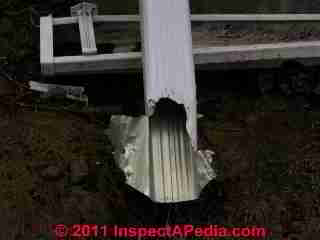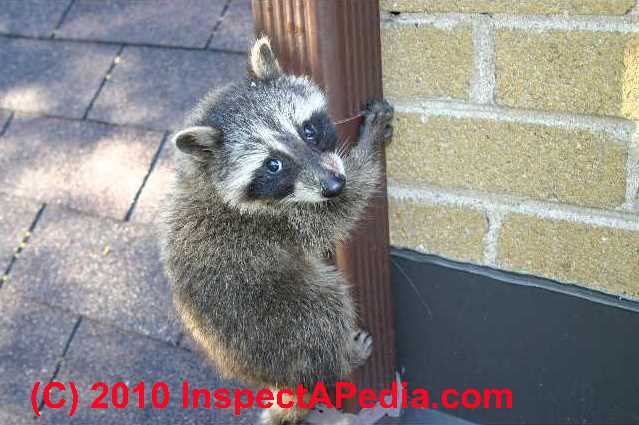 Animal Noise Problems in Buildings
Animal Noise Problems in Buildings
Diagnose, & Cure Animal or Pest Noise Problems in Building Interiors
- POST a QUESTION or COMMENT about diagnosing the source and finding the cure for noises or sounds in or around buildings and their systems
Building noise troubleshooting traced to animals, pets, rodents, birds, bats or other invaders: animal noise pest causes & cures.
These articles discuss building noise control: how to inspect, diagnose & cure noise or sound problems in homes or commercial buildings.
The cute raccoon shown above is discussed in this article.
InspectAPedia tolerates no conflicts of interest. We have no relationship with advertisers, products, or services discussed at this website.
- Daniel Friedman, Publisher/Editor/Author - See WHO ARE WE?
Animal noise and animal-caused noises in buildings, diagnosis & cure
What about animal noises heard indoors: beyond the obvious barking dogs, meowing cats, and chirping birds, other uninvited animals can be a source of noise or even more serious damage or health related problems in buildings?
Once upon a midnight dreary, while I pondered, weak and weary,
Over many a quaint and curious volume of forgotten lore,
While I nodded, nearly napping, suddenly there came a tapping,
As of someone gently rapping, rapping at my chamber door.
" 'Tis some visitor," I muttered, "tapping at my chamber door;
Only this, and nothing more." - The Raven, Edgar Allen Poe 1845
- Bats
trapped in an attic or duct work can produce slapping or fluttering sounds.
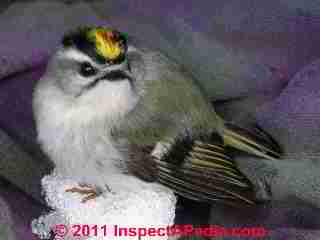
- Birds
as noise sources in and around buildings: cheeps, chirps, squawks, taps, thumbs, scratching, tapping, rapping, flapping, etc.- Crows may produce an intermittent, slower tapping sound on building roofs or other low-sloped or horizontal surfaces, sometimes we're not sure what the crow is up to, or it may be working on something to eat.
- A fluttering
or other noises in duct work or in a chimney may indicate that a bird or bat has become trapped there - Tapping
and rapping sounds on the building exterior: look for woodpeckers signaling or even making holes in wood exterior sidings in search of insects. - Thuds and clunks
traced to birds crashing into windows and doors : sadly, birds smashing into windows or sliding glass doors can create a sudden large thunk. We note that bird collisions with glass happen principally under certain light and reflection conditions. Special bird-collision resistant glass and plastic owls as well as solar shades can reduce this hazard.
Tips for rescuing birds stunned by crashing into glass: The golden crowned kinglet shown above flew into glass patio doors and was stunned. If you intend to "rescue" such a bird, avoid handling it and do not bring it indoors - those steps will further traumatize the bird.
We scooped up the kinglet without touching it (hence the cluster of snow on which it stands) and set it gently into an open box placed outdoors, giving it protection from local animals for the hour or so it took to recover and fly away.
Here is a PHOTO of the Golden-crowned Kinglet after it recovered and flew to a nearby tree. Sarah Hager Johnston, Peregrine Information Consultants, kindly identified this bird for us, explaining that:
this is actually a Golden-crowned Kinglet, identified by the black and white stripes on either side of the golden patch.
This looks like a first-year male. Its cousin the Ruby-crowned Kinglet has a tiny red bit on the top of its head, which rarely shows unless the bird is excited. [5] - Thumping on flat roofs:
we have observed crows tapping and thumping around on flat and low slope roofs, perhaps signaling, or opening seeds and nuts - Woodpeckers
may produce a rapid tapping sound on exterior siding or trim, possibly a clue that insects are attacking the building or even if there are no insects in your siding or roof, the woodpecker may be simply thumping and rapping as a territorial or mating signal.
- Groundhogs
are more often found digging by and nesting under buildings; we tracked noises in a barn to a ground hog family living below. Usually they were quiet.
See GOPHER HOLE DAMAGE for how we got the groundhog out from under the barn.
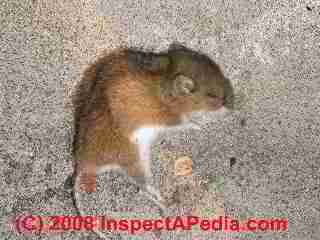
- Mice / Rats
(photo above, mouse found in suspended ceiling) can produce a scuffling or scrambling sound in attics, ceilings, walls. When trapped a mouse or rat may produce a ripping or tearing sound as it is trying to gnaw its way to freedom.
See ANIMAL ENTRY POINTS in BUILDINGS.
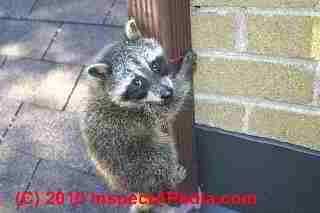
- Raccoons
in buildings: if you hear scrambling around in the attic or basement, or scratching and scraping sounds on the building exterior you may find that one or more raccoons has invaded the building or is climbing around on exterior downspouts.
In a South Grand Avenue Poughkeepsie NY home two raccoons fell in love with our Christmas ornaments stored inside boxes kept the attic. At night one could hear a swat followed by a rolling sound as round ornaments were batted around the floor.
Packing away the shiny and tinkly ornaments more deeply into trunks did not keep the raccoons from digging them out the next night.
The solution to the raccoon out-of-season holiday fun was the discovery and closure of their entry point into the building. After that the attic was silent and the raccoons were rather mad.
Details of that raccoon invasion are at
RACCOONS in the ATTIC
Then see ANIMAL ENTRY POINTS in BUILDINGS. - Squirrels,
chipmunks, other rodents in buildings can produce a scuffling or scrambling sound in attics, ceilings, walls. When trapped a small animal may, like the mouse example above, produce a ripping or tearing sound as it is trying to gnaw its way to freedom.
A squirrel trapped inside a downspout can cause the family dog to go crazy tearing and gnawing at the downspout bottom (photo, below).
- Skunks
in buildings are pretty quiet, but are sometimes found nesting in or under buildings. - See ANIMAL or URINE ODOR SOURCE DETECTION - how to find and remove animal odors, pet urine odors, etc.
- See Environmental hazards: allergens, EMF, lead paint, lead in water, leaks, moisture, venting, mold-contamination, MVOCs, radon, toxic gases
- See ODORS GASES SMELLS, DIAGNOSIS & CURE - how to identify and remove all kinds of odors in buildings
...
Continue reading at APPLIANCE NOISE DIAGNOSIS or select a topic from the closely-related articles below, or see the complete ARTICLE INDEX.
Or see these
Recommended Articles
- ANIMAL ENTRY POINTS in BUILDINGS - home
- NOISE / SOUND DIAGNOSIS & CURE - home
- RACCOONS in the ATTIC - playing with Christmas tree ornamens
Suggested citation for this web page
ANIMAL NOISES in BUILDINGS at InspectApedia.com - online encyclopedia of building & environmental inspection, testing, diagnosis, repair, & problem prevention advice.
Or see this
INDEX to RELATED ARTICLES: ARTICLE I NDEX to BUILDING NOISE DIAGNOSIS
Or use the SEARCH BOX found below to Ask a Question or Search InspectApedia
Ask a Question or Search InspectApedia
Try the search box just below, or if you prefer, post a question or comment in the Comments box below and we will respond promptly.
Search the InspectApedia website
Note: appearance of your Comment below may be delayed: if your comment contains an image, photograph, web link, or text that looks to the software as if it might be a web link, your posting will appear after it has been approved by a moderator. Apologies for the delay.
Only one image can be added per comment but you can post as many comments, and therefore images, as you like.
You will not receive a notification when a response to your question has been posted.
Please bookmark this page to make it easy for you to check back for our response.
IF above you see "Comment Form is loading comments..." then COMMENT BOX - countable.ca / bawkbox.com IS NOT WORKING.
In any case you are welcome to send an email directly to us at InspectApedia.com at editor@inspectApedia.com
We'll reply to you directly. Please help us help you by noting, in your email, the URL of the InspectApedia page where you wanted to comment.
Citations & References
In addition to any citations in the article above, a full list is available on request.
- In addition to citations & references found in this article, see the research citations given at the end of the related articles found at our suggested
CONTINUE READING or RECOMMENDED ARTICLES.
- Carson, Dunlop & Associates Ltd., 120 Carlton Street Suite 407, Toronto ON M5A 4K2. Tel: (416) 964-9415 1-800-268-7070 Email: info@carsondunlop.com. Alan Carson is a past president of ASHI, the American Society of Home Inspectors.
Thanks to Alan Carson and Bob Dunlop, for permission for InspectAPedia to use text excerpts from The HOME REFERENCE BOOK - the Encyclopedia of Homes and to use illustrations from The ILLUSTRATED HOME .
Carson Dunlop Associates provides extensive home inspection education and report writing material. In gratitude we provide links to tsome Carson Dunlop Associates products and services.


